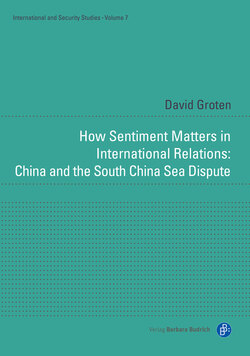Читать книгу How Sentiment Matters in International Relations: China and the South China Sea Dispute - David Groten - Страница 27
На сайте Литреса книга снята с продажи.
[53] 2.3.3 References to Status and Social Importance
ОглавлениеAs status and status concerns represent the core component of the shared definition of national respect as the perceived adequate recognition of an actor’s self-ascribed self-worth by others (expressed in words, gestures and deeds), status constitutes the second and perhaps most crucial indicator of respect dynamics. In line with sociology and social psychology, status is often understood as “social esteem and respect that usually yields influence” (Ridgeway, 2006, p. 301). That said, groups seek to be treated in a manner congruent to their self-ascribed status and “rightful position” (Wolf, 2011, p. 3). Status misrecognition or deprivation, in contrast, is expected to cause the opposite effect, namely disrespect. As discussed earlier, states may seek status for material or self-evaluative reasons. For instance, a powerful (not necessarily positive) international image and reputation may have a positive effect on the political legitimacy of China’s political elite, for instance due to dominant patriotic and nationalist sentiments among Chinese citizens desiring international respect for self-esteem grounds (Lepsius, 1990; Noesselt, 2012, p. 128). Likewise, conduct by interaction partners viewed by China as adequately reflecting its status entitlements can serve as an external confirmation of China’s self-worth and its related psychological needs. Moreover, this second indicator seeks to examine whether a link between status self-perception and the status of interaction partners can be observed. In this vein, it is scrutinized whether a greater Chinese status is accompanied by higher sensitivity to questions of status or not. This is because Chinese FPTTs are expected to be more eager to obtain respect from a high-ranking actor and more likely to perceive that actor’s conduct in a more critical manner than that of a lower-status actor (Fikenscher & Wolf, 2015, p. 170). Against this background, manifestations and signs of status awareness and concerns are located, contextualized and qualified here.
